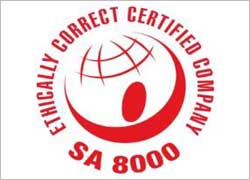SA8000 Consultancy Service
 SA8000 is a global social accountability standard for decent working conditions, developed and overseen by Social Accountability International (SAI). SA8000 is a global social accountability standard for decent working conditions, developed and overseen by Social Accountability International (SAI).
The SA8000 standard for socially responsible employment practices first appeared in 1998 after nearly a year of drafting by the advisory board.
An advisory board comprising 25 experts from a wide range of backgrounds, including businesses, trade unions and non-governmental organizations, drafted the terms of SA8000. Now that the code has been finalized, SAI is overseeing the certification of companies that have expressed a desire to become SA8000-compliant.
Social Accountability 8000 (SA8000) has been developed by Social Accountability International (SAI), known until recently as the Council on Economic Priorities Accreditation Agency. SAI is a non-profit affiliate of the Council on Economic Priorities (CEP). SA8000 is promoted as a voluntary, universal standard for companies interested in auditing and certifying labour practices in their facilities and those of their suppliers and vendors. It is designed for independent third party certification.
Benefits of SA8000
Initial evidence indicates that SA8000 certified facilities enjoy a competitive advantage and workers experience concrete benefits as the SA8000 management system and any needed corrective actions are put in place.
Benefits for Workers, Trade Unions and NGOs:
- Enhanced opportunities to organize trade unions and bargain collectively.
- A tool to educate workers about core labor rights.
- An opportunity to work directly with business on labor rights issues.
- A way to generate public awareness of companies committed to assuring humane working conditions.
Benefits for Business:
- Drives company values into action.
- Enhances company and brand reputation.
- Improves employee recruitment, retention and productivity.
- Supports better supply chain management and performance.
Benefits for Consumers and Investors:
- Clear and credible assurance for ethical purchasing decisions.
- Identification of ethically made products and companies committed to ethical sourcing.
- Broad coverage of product categories and production geography.
SA8000 Elements
A summary of the Standard elements follows:
Child Labor: No workers under the age of 15; minimum lowered to 14 for countries operating under the ILO Convention 138 developing-country exception; remediation of any child found to be working.
Forced Labor: No forced labor, including prison or debt bondage labor; no lodging of deposits or identity papers by employers or outside recruiters.
Health and Safety: Provide a safe and healthy work environment; take steps to prevent injuries; regular health and safety worker training; system to detect threats to health and safety; access to bathrooms and potable water.
Freedom of Association and Right to Collective Bargaining: Respect the right to form and join trade unions and bargain collectively; where law prohibits these freedoms, facilitate parallel means of association and bargaining.
Discrimination: No discrimination based on race, caste, origin, religion, disability, gender, sexual orientation, union or political affiliation, or age; no sexual harassment.
Discipline: No corporal punishment, mental or physical coercion or verbal abuse.
Working Hours: Comply with the applicable law but, in any event, no more than 48 hours per week with at least one day off for every seven day period; voluntary overtime paid at a premium rate and not to exceed 12 hours per week on a regular basis; overtime may be mandatory if part of a collective bargaining agreement.
Compensation: Wages paid for a standard work week must meet the legal and industry standards and be sufficient to meet the basic need of workers and their families; no disciplinary deductions.
Management Systems: Facilities seeking to gain and maintain certification must go beyond simple compliance to integrate the standard into their management systems and practices.
|